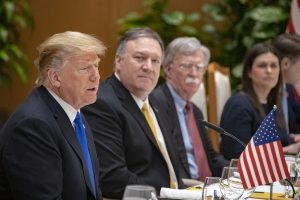News and views on U.S.-Iran relations for February 16:
- The Wall Street Journal: The Journal’s editorial board elaborates on “Why Tehran’s thugs will be harder to depose than Hosni Mubarak” and observes that the U.S. has less leverage over Iran’s leadership because “Tehran scorns the West.” Or, “To put it another way, pro-American dictatorships have more moral scruples.” The WSJ calls for Washington to impose greater isolation and pressure on Iran, and warns, “Yet many policy makers and pundits in the West still want to engage the regime as if it were merely another thuggish status quo power, rather than the greatest threat to world order.”
- Commentary: Commentary Executive Editor Jonathan Tobin warns against complacency after the news that Stuxnet had done massive damage to the Iranian nuclear program. “Somehow, despite the sanctions and the ban on selling nuclear equipment to Iran, the damaged centrifuges were replaced almost as quickly as they were taken offline,” he says. “At best, it has delayed them a bit, but the IAEA evidence makes it clear that the Khamenei/ Ahmadinejad regime’s commitment to their goal of a nuke is such that cyberattacks won’t be enough to derail them,” he continues. Tobin goes on to lash out at the Obama administration for wasting time and effort in “engagement” with Iran and concludes, “[I]f the IAEA evidence is correct, then the optimistic forecasts about Tehran’s prospects must be thrown out and replaced with an evaluation that puts the need for either serious sanctions or the use of force back on Washington’s front burner.”
- The Washington Post: Jennifer Rubin blogs on her “Right Turn” blog—a blog which is supposed to cover the “conservative movement and the Republican party” but disproportionately focuses on Iran and Israel—that sanctions against Iran have failed and that it’s time to reexamine the military option. “Neither the administration’s touted sanctions nor a computer virus has slowed the Iranian regime’s quest for nuclear weapons. For all the chest-puffing by the Obama team, sanctions have in fact not ‘worked,’” she writes. She consulted the American Enterprise Institute’s John Bolton, a former UN ambassador, who told her, “U.S. policy should be regime change in Iran, with both overt and covert assistance to opposition groups willing to accept it.” Bolton goes on to warn, “[A]n Iranian crash program could produce a nuclear weapon in one year. That means there are still only two options: Let Iran get nuclear weapons or use preemptive military force.”




